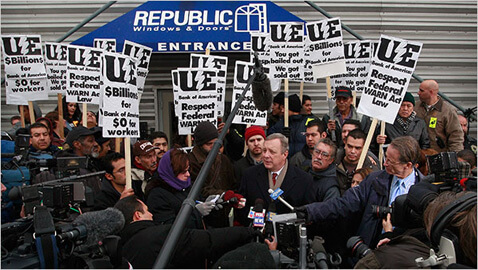
And here’s the statutory disclaimer before someone concludes biased reporting – we are neither against Occupy Wall Street, nor for it, but would praise anything we find worth praise and criticize anything we find we should criticize.
So here comes the story:
A large number of workers and their union with support from Occupy Chicago emerged victorious after occupying the Chicago plant of California-based Serious Energy Company for 11 days.
The protests kept the plant from immediate closure and postponed the shutdown of facilities for another 90 days. A respite within which the workers and their union think they can put viable alternatives in place to keep their jobs.
So what are the alternatives agreed upon?
One alternative includes the possibility of the workers themselves teaming up to purchase the factory and create a worker owned cooperative.
Juan Cortez, a worker who has been in the factory for over 23 years told the media, “We can run this company…We got smart people to manage the money. We can find customers. We know how to run the company.”
This is not the first time this particular group of workers is using the “occupy” tactics. They are building upon an experience of a previous win when in 2008, during the high recession the workers had occupied the same factory for six days and compelled the former owners into a position making Bank of America reach a $1.75 million settlement with the workers.
The recent event kicked off when the workers were called to a law firm and informed that their jobs are terminated with immediate effect and they would receive 60 days of Worker Adjustment and Retraining Notification (WARN) Act benefits. However, work would immediately cease and the company would start dismantling the plant for sale. The workers did not accept the proposition.
Workers refused to leave company premises from that day onwards, camping in shifts to keep the company going and to prevent the initiation of dismantling operations. Occupy Chicago arrived on the scene in support of the workers with rations and supplies.
Occupy tents sprung up to protect the camping workers from weather and after 11 days of resolute impasse, the company owners relented and made a conciliatory settlement with the workers to postpone shut down for 90 days while alternatives to the situation are sought.
Armando Robles, the UE Local 1110 President said, “We got a good resolution, better than we expected.”
The settlement amounted to an agreement by which the workers would keep their jobs for the next 90 days, and in the meanwhile they can either team up to purchase the plant to run by themselves, or find new owners for the plant.






































